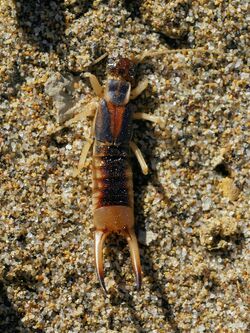Biology:Labidura
From HandWiki
Short description: Genus of earwigs
| Labidura Temporal range: Eocene-Quaternary
| |
|---|---|

| |
| Labidura riparia | |
| Scientific classification | |
| Domain: | Eukaryota |
| Kingdom: | Animalia |
| Phylum: | Arthropoda |
| Class: | Insecta |
| Order: | Dermaptera |
| Family: | Labiduridae |
| Subfamily: | Labidurinae |
| Genus: | Labidura Leach, 1815 |
| Species | |
|
See text | |
| Synonyms | |
| |
Labidura is a genus of earwigs in the family Labiduridae.[1] Probably the earliest specimen of Labidura was found in Eocene amber.[2] Among the Labidura species, Labidura riparia is cosmopolitan, but the Saint Helena earwig (Labidura herculeana) was the largest of all earwigs before its possible extinction after the year of 1967.[3][4]
Species
The genus contains the following species:[1]
- Labidura cryptera Liu, 1946
- Labidura dharchulensis Gangola, 1968
- Labidura elegans Liu, 1946
- Labidura japonica (Haan, 1842)
- Labidura minor Boeseman, 1954
- Labidura orientalis Steinmann, 1979
- Labidura riparia (Pallas, 1773)
- Labidura xanthopus (Stal, 1855)
- †Labidura herculeana (Fabricius, 1798)
References
- ↑ Jump up to: 1.0 1.1 "genus Labidura Leach, 1815". http://dermaptera.speciesfile.org/Common/basic/Taxa.aspx?TaxonNameID=1179928.
- ↑ M. Burr. 1911. Dermaptera (earwigs) preserved in amber, from Prussia. Transactions of the Linnean Society of London, Second Series, Zoology 11:145-150
- ↑ "Labidura". St Helena and Ascension Island Natural History. http://www.kidstonmill.org.uk/Labidura.htm.
- ↑ Matt Walker (2014-11-17). "World's largest earwig is declared extinct" (in en). http://www.bbc.com/earth/story/20141117-giant-earwig-declared-extinct.
Wikidata ☰ Q17627410 entry
 |

